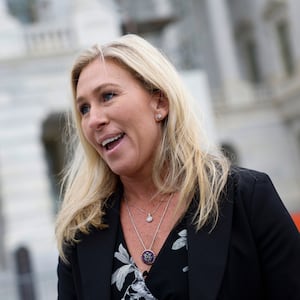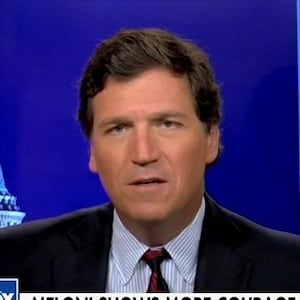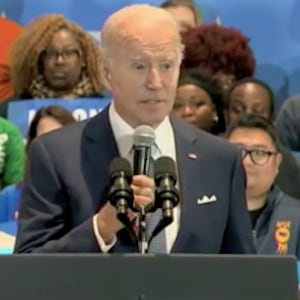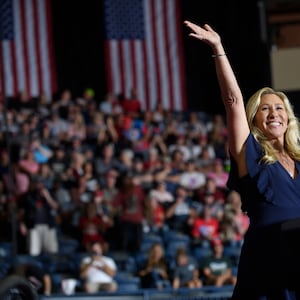One was present during the Jan. 6 attack on the Capitol. Two spoke at a rally outside the Capitol last September demanding “justice” for those jailed for their alleged crimes there.
One used the Supreme Court’s overturning of Roe v. Wade to call for the end of gay marriage. Another happily threatened to tear-gas journalists. And another wrote a bill in the Missouri legislature that was half-jokingly dubbed the “Make Murder Legal Act.”
One promised to vote no on almost every bill and subpoena every federal agency. And another called the FBI’s raid on Mar-A-Lago this summer “worse than Watergate.”
All of them have something in common: They are very likely to be Republican members of Congress come January 2023.
As the GOP campaigns to win the House majority from Democrats, the national spotlight has shined squarely upon the handful of candidates who could tip control of the chamber if they win in November.
The candidates running quiet campaigns in safely red seats won’t decide which party controls Capitol Hill. But if Republicans win the House majority, as is widely expected, they are poised to play an outsized role in influencing how the party wields its power and what is included in the GOP agenda.
Already, freshman Republicans like Rep. Marjorie Taylor Greene (R-GA) have used their clout with the party base, and with Donald Trump himself, to pressure Minority Leader Kevin McCarthy (R-CA) and shape the House GOP’s agenda in a more MAGA-friendly image.
When this incoming class of conservative hardliners joins those already on Capitol Hill, a potential Speaker McCarthy could have dramatically more headaches to deal with than he did before.
That’s not only because these lawmakers’ controversial antics and views could distract from the House GOP’s messaging, just as Greene and others have routinely done over the last two years. But under a Republican majority, these lawmakers could form a boisterous bloc willing to leverage their influence with the party base to pick fights on everything from funding the federal government to investigating the Biden administration.
Republicans, said former Rep. Denver Riggleman (R-VA), are in a “hold-my-beer moment.”
“If you believe your position is one where you’re fighting against evil… your desire to fight at that level absolutely overwhelms someone trying to come in as a sane policymaker,” said Riggleman, who left the GOP after losing reelection in 2020 to a far-right challenger.
Brendan Buck, a former top aide to former Speaker Paul Ryan (R-WI), said that no one should expect the new arrivals to begin causing trouble from day one. He noted some might end up abandoning their anti-establishment rhetoric and become team players once arriving in Washington.
“Only so many of them can gather the kind of following and attention you need to really become relevant,” Buck told The Daily Beast. “There will certainly be some people who become famous. The question is to what end, and is this a group that can work together toward anything in particular—or are they happy just being famous on Fox News?”
What the group does have in common is that, right now, all are so far to the right that they could make the past iterations of the Freedom Caucus look like a Jeb Bush fan club by comparison.
“The next Congress will certainly feature a more radical Republican conference than anything we’ve ever seen,” said Rep. Jared Huffman (D-CA). “Whether they’re in the majority or the minority, they’re going to have a hard time governing.”
Within the likely members of the Class of 2022, fringe views abound, from conspiracies about the 2020 election and Jan. 6 to uncompromising positions on guns, abortion, and other hot-button issues.
McCarthy, Riggleman predicted, “is going to have to pick and choose what kind of crazy he wants in which positions of his committees.”
Three very likely incoming Republicans, for instance, either were at the U.S. Capitol on Jan. 6 or later headlined a rally that was a hub of conspiracy-theorizing about the attack that day.
Former Navy SEAL Derrick Van Orden, for instance, is favored to win his race to represent western Wisconsin in Congress. He has earned the endorsements of both Trump and McCarthy. Van Orden was present at the Capitol grounds on Jan. 6, even though he had insisted he was not, The Daily Beast has reported. He paid for the trip to Washington using campaign funds.
Two candidates spoke at a Sept. 2021 rally outside the U.S. Capitol demanding justice for people they called “political prisoners.” Those “political prisoners” were arrested and charged in connection with their activities there on Jan. 6. Every sitting GOP member of Congress, including figures like Greene, kept their distance from the event, which drew a paltry crowd of roughly 500 amid an intense law enforcement presence and media scrutiny.
Despite the bizarre atmosphere, the rally served as a launchpad for Mike Collins, a trucking businessman who is a lock to win election to a deep-red Georgia seat. Collins had deep links to the “Justice for J6” event: he timed it with the launch of his campaign, and the rally’s organizer was handling communications for his bid in its early stages.
Before he was introduced at the rally, an intro speaker said that Collins’ phone was full of messages from people telling him not to come to the event over worries it was a “false flag” and applauded him for being brave enough to attend.
During his speech, Collins didn’t delve deeply into Jan. 6 conspiracy theories himself, but argued that those being held in jail “are political prisoners, and they are being used to suppress law abiding American citizens from suppressing their First Amendment rights.”
Another speaker at the September rally was Joe Kent, a Washington state Republican who ousted Rep. Jaime Herrera Beutler (R-WA) in a primary and is favored to win in November. Kent has expressed a theory that the Jan. 6 attack was an “intelligence operation.”
At the rally, Kent expressed disappointment that no other GOP lawmakers attended and made the first of many calls for Republicans to dump McCarthy as leader if they take the majority. Instead, Kent told Forbes that he’d support Rep. Jim Jordan (R-OH)—“or we can go full disruption” by elevating Greene, or Reps. Matt Gaetz (R-FL) or Paul Gosar (R-AZ).
Andy Ogles, a conservative activist who is a near-lock for election to a newly created Republican seat in Tennessee, wasn’t at the Capitol on Jan. 6. But he did speak at a “prayer rally” that day outside the Tennessee state capitol that was timed with the protest in Washington.
There, Ogles gave a fiery speech in which he declared that “we are in a war right now… it is a political war and it is a spiritual war.” Referring to Democrats’ wins in neighboring Georgia in 2020, Ogles said that “the liberal hordes are at our doorstep” and “the hordes of hell are here to wage war upon us.”
A number of likely GOP members of Congress will bring histories of outright denying the 2020 election result, as well as a morass of conspiracy theories about the process, to Capitol Hill next year.
During his primary, Collins released videos showing him firing a shotgun at a cut-out of a rhino—meant to stand in for “Republicans In Name Only”—and firing an assault rifle at an exploding garbage can with the words “voting machine” taped over it as he recited debunked theories about Trump winning Georgia.
Cory Mills, who is set to win a safely red seat near Orlando, has said he believes the 2020 election was “rigged” against Trump. During his primary, in which he edged out a Gaetz-backed state lawmaker, Mills ran a TV ad touting his company that manufactures “riot control munitions” for police.
“You may know some of our work,” Mills says, as the ad cuts to footage of protesters in various cities being tear-gassed, including an image of someone being treated by rinsing their eyes with milk. Alluding to press scrutiny of that record, Mills grinningly said, “if the media wants to shed some real tears, I can help them out with that.”
In a nearby Florida district, Anna Paulina Luna, a minor MAGA celebrity who found an audience while working for the activist group Turning Point USA, is favored to win a Tampa-area district. In 2021, Luna amplified conspiracy theories about the election outcome in Arizona, and the debunked GOP audit of the results, on social media.
Luna, who perhaps most shares the style and background of current lawmaker-influencers like Greene and Rep. Lauren Boebert (R-CO), also called the FBI search of Mar-A-Lago “worse than Watergate” and said it amounted to “Soviet-style behavior.”
If Republicans are in the majority next year, these likely freshmen lawmakers’ views on Jan. 6 and the 2020 election will matter. Republicans have said they will use their power to pursue aggressive investigations on a number of topics, from the Biden family’s business dealings to the withdrawal of U.S. troops from Afghanistan.
Top lawmakers have promised to keep these investigations focused and buttoned-up, but it’s likely that a burgeoning MAGA caucus would push hard to expand their investigatory power to the fever swamps, from investigating the 2020 election, to investigating Democrats’ own investigation of Jan. 6, to standing up an entire committee to deal with Hunter Biden’s laptop.
Buck, the former Ryan aide, predicted that oversight is the area where McCarthy and his team may be forced to cede ground to their most right-wing members. Because the rank and file will be pushed to do governing tasks they don’t want to do—like fund the government—oversight could serve as a “release valve,” as he put it, to placate them.
Still, other potential incoming Republicans are poised to push the envelope on policy—regarding guns, abortion, and same-sex marriage—that could help define their agenda.
At a recent campaign event, Ogles seized on the Supreme Court’s overturning of the national right to abortion to promise that, if elected, he would push for states to overturn same-sex marriage rights.
“Next thing we need to do is go after gay marriage,” Ogles said. “We’ll empower the states to take action on those issues, whether it’s guns, marriage, or abortion.”
Two state lawmakers from Oklahoma and Missouri, meanwhile, are bringing hard-edged conservative tactics from those state capitols to Capitol Hill. Eric Burlison, who is a lock to represent a deep-red southern Missouri district, made a name for himself in that state for introducing legislation that would nullify federal gun laws there.
Burlison also introduced a bill that would modify state law to treat all cases of deadly use of force as self-defense “unless proven otherwise.” One state prosecutor dubbed the bill the “Make Murder Legal Act.”
In Oklahoma, state lawmaker Josh Brecheen is known for regularly introducing bills to allow school teachers to instruct students in “alternative theories” to scientifically established facts like climate change. He has already committed to voting no on most bills that come up in Congress and has vowed to “subpoena every area of federal government spending and put every agency under subpoena.”
Republicans, like Riggleman, express hope that new arrivals to the GOP from more moderate districts could provide a counterweight. But many Democrats believe that it’s the provocateurs who will define the direction of the party, no matter whether they take the majority or not.
“There is no great way to engage or respond to some of their antics, so I think it will depend on how much adult supervision occurs in their conference,” Huffman said. “But Democrats will need to strike a careful balance between pushing back between lies and outrageous statements and not wrestling with a pig and getting mud all over yourself.”











